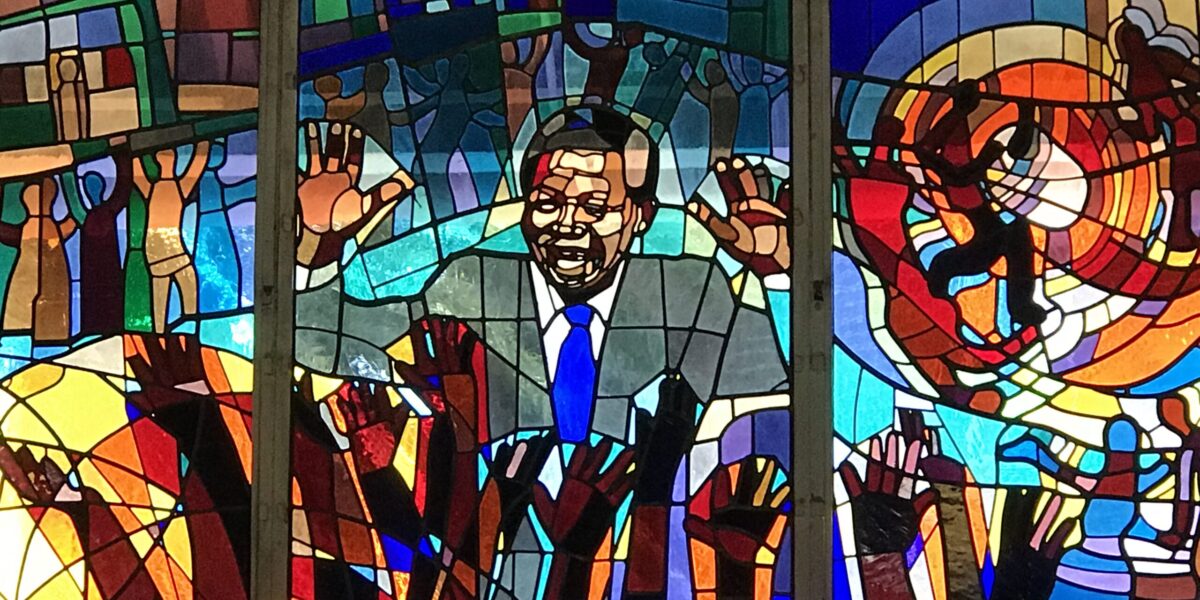Editor’s Note: Joe Sawatsky, a church relations representative for Mennonite Mission Network, was asked to reflect on Nelson Mandela, who is celebrated on July 18, an international holiday set aside to honor the leader who helped topple apartheid in South Africa.
Nelson Mandela, who would have turned 103 July 18 —which is now an international holiday in his honor — is, rightly, an icon of forgiveness. Yet forgiveness, at the very heart of the prayer that Jesus taught his disciples in Matthew 6 and Luke 11, is fraught with controversy. Many allege that forgiveness delays justice by absolving oppressors without their repentance, by denying reparations for the oppressed.
In what follows, I recount two examples of forgiveness from Mandela’s leadership that inspire me and place them within the biblical call for justice.
In 1993 — the year before the official end of apartheid, the separate and unequal system of White-minority rule in South Africa — Chris Hani, a beloved leader of the Black freedom struggle, was shot and killed outside his home. His assassin, a Polish immigrant, sought to derail negotiations toward a new government.
On the brink of civil war, Mandela, not yet the president, assuaged the nation’s fears in a televised address. Without denying White culpability, Mandela generously framed the struggle as a multiracial pursuit of justice, seizing upon the fact that a White woman had reported the killer’s license plate to police. In Mandela’s words, "A white man, full of prejudice and hate, came to our country and committed a deed so foul that our whole nation now teeters on the brink of disaster. A white woman, of Afrikaner origin, risked her life so that we may know, and bring to justice, this assassin."
Extending grace, Mandela’s words kept the country on track toward its first free and fair elections that were held on April 27, 1994.
In 1995, barely a year into his presidency of the new, democratic South Africa, Mandela — in a kind of positive appropriation — enlisted a cherished symbol of Afrikaner culture in a nation’s still precarious pursuit of truth, justice and reconciliation. In pre-game ceremonies, before their championship match against New Zealand, at the rugby World Cup, Mandela donned the cap and jersey of the Springboks, South Africa’s national team.
This was no small gesture. The figure of Mandela, gliding across the turf at Johannesburg’s Ellis Park, cut a swath of historical irony. Mandela, the representative of Black South Africa, who once despised the Springboks as symbols of its oppression, offered himself to White South Africa in shades of green and gold. The mostly White crowd at Johannesburg’s Ellis Park, who once despised Mandela as public enemy number one, now acclaimed him as their president, in growing chants of "NEL-SON, NEL-SON."
Following a dramatic and improbable Springbok victory, Francois Piennar, the team’s captain, reciprocated Mandela’s grace. In his postgame interview, Piennar corrected the reporter’s claim that more than 60,000 South Africans, who were present in the stadium, had provided "tremendous support." "We didn’t have 60,000 South Africans," Piennar exclaimed, "we had 43 million South Africans," referring to the total population — Black and White together.
Powerful as they are, neither of these events eliminated racism and injustice from South Africa. Indeed, forgiveness is powerful, but it is vulnerable. Grace is given, but it is not always accepted. Love is extended, but it does not automatically produce repentance. Even so, we remember these acts as calls to action, to allow grace to flow through us for the healing of an unjust world. Aware that some would put God’s grace to the test by continuing in sin, the apostle Paul pleaded, "Should we continue in sin in order that grace may abound? By no means!" (Romans 6:1-2 NRSV). Rather, having accepted Christ’s forgiveness, let us walk with him in newness of life.








